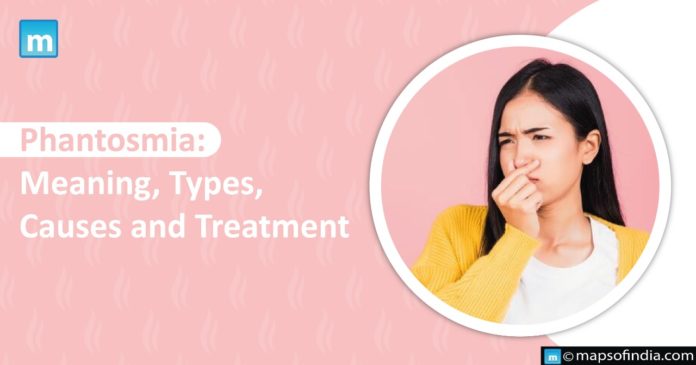If you can smell something not present in your surroundings, then it is a situation of Phantosmia. It is related to the person’s smell, where the odour could be present on one side of the nose or affect both nostrils.
Phantosmia is also known as olfactory hallucination or phantom odour. A person feels a smoky or foul smell in either nostrils or both. It accounts for 0.8-25% of Phantosmia in the general populace, and mostly, women experience this.
It involves the hallucination of smells by a person or an imaginary situation related to it. Smells consist of burning rubber, burnt toast, cigarette smoke, a rotten or rotting smell, a chemical or metallic smell and a stale or mouldy smell. It could be noticed during the day or night related to the brain or central nervous system. The odours occur frequently. If it is due to a cold, sinus infection, or respiratory infection, it should get rid of itself after the illness resolves.
Following are the types of Phantosmia:
- Central: It includes the regions within the brain that intake smell signals into the body.
- Peripheral: It consists of the olfactory neurons or nerve cells propagating the smell signal to the brain.
Ageing, Sinus and other upper respiratory infections, Smoking, Head injury, dental problems, exposure to chemicals like solvents and insecticides, and conditions that affect the nervous system like Parkinson’s disease or Alzheimer’s disease are some of the common causes behind Phantosmia.
According to the medical team review of Medindia, Dr Smitha S. Dutt states that it is not risky in most cases as it resolves within weeks, months or years. A medical check-up is required so the doctor can know if there is any underlying problem and then recommend safety measures accordingly.
Tests could include MRIs, Imaging tests, CT scans and EEGs, and endoscopy, which involves using a small camera known as an endoscope to see the inside of the person’s nasal cavity.
Medical professionals often advise some relief measures such as:
a) rinsing your nasal passages with a saline solution (for instance, with a neti pot) may offer temporary alleviation for a short duration. This may temporarily block the smell signals going to your brain, but one is required to keep doing it.
b) Oxymetazoline spray to lower nasal congestion and an anaesthetic spray to numb your olfactory nerve cells.
It becomes essential to visit the doctor and consult for diagnosis before self-treatment. A doctor may ask about one’s lifestyle habits, diseases in family history and related questions to know the exact cause.
Nearly 25% of people who participated in a 12-week “smelling gymnastics” exercise saw a clearing of their parosmia symptoms, said a small study in 2009. Around 60% of the cases are due to infections. Phantosmia influences a person’s sense of smell and may result in less appetite and weight loss. The odour could be different, which the person didn’t have to encounter earlier. Similarly, treatment depends on person-to-person after the tests prescribed by the medical professional.




